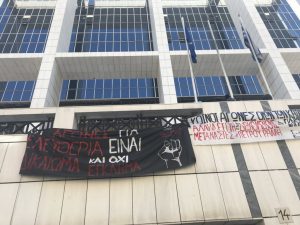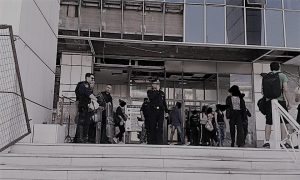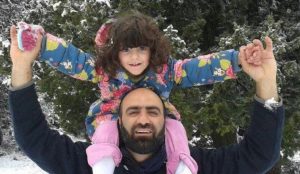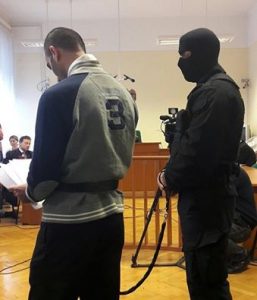Wir teilen ein Gespräch mit den acht Menschen von Petrou Ralli, das vom Community of Koukakis Squats geführt und veröffentlicht wurde (https://de.indymedia.org/node/24009)
Inside the fascist core of the greek state: A conversation with the 8 of
Petrou Ralli

Following is a series of testimonies from several different voices with
common experiences. It is the result of conversations between eight
ex-detained migrants from Algeria – known from the case of the “8 of
Petrou Ralli” – with female comrades from the Community of Kukaki’s
Squats. The purpose of the text is to give visibility to the reality
that the migrants imprisoned in the centres for administrative detention
and camps face every day. Those who delivered these testimonies, do no
want to serve the spectacle through which many westerners, in greece and
elsewhere, consume the migrant’s situation. It is not written from the
position of a journalist or an academic researcher. On the contrary, we
fought to take these people out of the prison, we live together, in a
community struggling against the same threat. It is the outcome of their
political will and trust, products of a long term communication that was
created by the Coordination of Collectives and Individuals Against the
Detention Centres (SSAEKΚ) since the moment they were in greek prisons
until today that are hosted in the structures of the movement. Political
will to share their experiences and uncover fascism for the next. Trust
in the ability of the movement to break the system that invisiblises
them. These testimonies enable us to perceive better the structures we
fight against, fascist structures of confinement that operate as
businesses. In order to understand what it means to encage people, all
the horror had to be laid bare. The horror of the greek, white supremacy
and its concrete reality, that humans live in their flesh and through
their existence.
First-world colonialism enforces migration to populations and sells them
the new european dream. From the moment one takes the decision to escape
a country due to its financial and political actuality finds himself,
herself struggling to pass the borders and avoid the prisons of the
various fortress states, as part of a crowded mass. Imprisonment for
migrants in europe and in greece can take many forms. One of them is the
administrative detention. The free transportation of a person is decided
on the base of hers, his papers. Ifthey are not accepted, they violently
transfer the arrested to the nearest detention centre. The cops through
a horrendous control try to tune the bodies in order to respond to a
torturing frame, a situation that is extended to the irrational time
realm of bureaucracy.But the bodies react to this dystopic reality. They
shout to demand their rights. They act. They set mattresses on fire.
They organise hunger strikes. They reach to suicide. During solidarity
gatherings, they try to communicate their word with their voices and
throw messages in bottles over the fences.
The police is really afraid of the these acts of revolt. They fear an
organised migrants’ resistance. So, they violently suppress them with
any means possible. It is usual to isolate them from the outside world,
blocking any kind of external encouragement to reach them. They want to
prevent their information and their co-organisation.On 2017, eight
detainees in Petrou Ralli, all from Algeria, were requesting to meet the
director of the prison to obtain accurate information about the reasons
of their imprisonment. Their request was met by fierce beating and
severe wounds (broken arms, skull fracture, etc.). They accused them for
revolt and escape attempt and dispersed them in different prisons around
greece. They awaited trial for over a year.
A multiform struggle arose as the needful reaction to the situation.
SSAEKΚ, in which comrades from Squat’s Community of Kukaki participate,
was in a constant, direct communication with the detainees, conducted a
counter-information campaign, organised solidarity gatherings, events in
open spaces and interventions.
In May 2018, even though the court found them guilty, allowed their
release. We offered them housing in the structures of Kukaki’s Squats.
We are a community, liberating our needs from state’s and capitalism’s
exploitation and organising our lives without hierarchy. In our spaces
they were able to stay together, rest and recuperate from the jail time,
stay away from the mafia and thepolice abuse of the peoplein the
streets. They are able to take time and explore all the available
options on how to continue their lives from now on.
As the time passed, we bonded more, building friendship and comradeship.
We lived together for more than three months. In those months, some left
for work or found other places to live, some chose to visit us
periodically. But we extended a family and our abilities to support the
struggle of those who try to reach europe and establish common ground
for actions against imprisonment, state borders, police brutality and
fascism.

In their words..
We are all from Algeria but each of us have a different story of how we
reached to greece. Four of us came through turkey and arrived in Chios
island, to a very miserable camp managed by certain NGOs. Food was not
provided and we were housed in tents. Fascists attacked us. Around 80
individuals defended the camp against them. When the police entered, two
hours later, they only arrested the Algerians.
We ended up in the detention centre of Korinthos, imprisoned for seven
months. Cops are also fascists. They don’t like Arabs and they treated
us very badly in the prison. One of us was sick and also has asthma but
they never transferred him to the hospital. This is a hardcore jail.
Food is not enough, you have to buy everything and a lot of people get
sick because of the bad hygiene. People there, self-harm as a way to get
out and numerous attempted suicide. We did some demonstrations inside
the prison because the cops weren’t accepting asylum requests. We also
organised mass hunger strikes. We managed to do four strikes of four
days each. The police responded by beating us with their sticks. During
our stay there, we were constantly itching, scratching and having
serious skin conditions. We were asking the cops to bring us to the
hospital every single day but they never cared. One of us managed to
cure himself of the infections by buying his own medicines, only a year
after when he was in Domokos prison. Before Petrou Ralli, the sent us to
other detention centres without any explanation. In Nafplio, in Tripoli…
There, the police had a lot of problems with us and they finally sent us
to “Alodapon” detention centre in Athens. We met with the others that
were already in the cell and together we became “the 8”.
The first that you see when you arrive in Alodapon is the face of the
police. A hard face “welcomes” you, especially if you are Algerian. They
push you until in the entrance of the building. “Mesa, mesa!” (Inside,
inside). They treat you badly from the beginning, they try to provoke,
they always make racist comments: “Go back to your country!”, “Why did
you come here?”, “What are you doing in greece?”. From the first moment,
we started communicating with the other prisoners. We asked questions
like: “Why are you here?”, “How is the situation in here?” and “When are
you getting out?”. But no one knew the answer for the last one.
To make make more clear the time some of the detained spend in, there is
a very characteristic example. When we firstly arrived in P. Ralli, we
met a man. A year after, when we passed again by Alodapon, to get our
release papers, we found the man there. He was detained for 14 months.
The second is the day you are really experiencing thing, the serious
things. The cops were intimidating us because we were trying to figure
out how it works inside. When you ask them the duration of your stay,
you will see that it is common to bring someone out of his cell, to the
yard or to a desk and beat him. Once, someone came back with a fractured
shoulder.
It’s really very dirty inside. They don’t provide with basic and hygiene
supplies. There are no bedsheets, towels, shampoo, soap or razors.
Everyone shouts to understand what the fuck is happening here. We are
literally like animals in cages, screamed at and beaten up. The water
comes from a dirty stock. They don’t give you water bottles so you have
to drink from there. The food is little and disgusting. They don’t give
spoons for everyone so we were eating with our dirty hands. Like this,
infections are spread fast. The bedbugs, the mosquitoes and the
cockroaches can be life-threatening in the big quantities they are. All
the beds are infected with bed bugs and you can’t sit anywhere without
getting bitten. When the police try to flush the insects out with
petrol, they went everywhere and were bitingus. The mattresses are so
infected that it is impossible to sleep normally. You can never really
sleep.
The Red Cross brought bedsheets but the police doesn’t give the things
brought by the NGOs. They come maybe once per month and the actual
conditions of the cells are hidden from them. Instead, they clean a cell
up and show them only that. The european union is making a lot of money
to keep people in jails like this. Inside everything is about money
also.They make a business out of telephones, alcohol, medicines and
drugs. If you have money the corrupted cops bring everything for you.
You can get bublecan (benzodiazepines) or shisha (the local name for
crystal meth) for a hundred euros. Many people take Subutex which is a
substitute for heroin and even though it is used for treatment, they get
addicted to it. The Georgians use it a lot.
To punish you, they might put you in the cells upstairs with the drug
addicts. They don’t have money for needles so they share the same and
spread diseases. One prisoner died from an overdose. When his inmates
took pictures with their mobiles, the copswent crazy and entered the
cells to find and take all the phones. Someone refused to give it
andthey broke three of his ribs. He was unable to walk for a month and
no doctor was involved. “Freedom” is a business also. If you bribe the
director 5000€, they will release you, directly. He is free to do as he
likes. He will write a fake report, saying that the prisoner had good
behaviour. A guy from Georgia paid this amount and when they caught him
again without papers he tried to negotiate his release for a 1000€ but
the director didn’t accept.
At the top of the hierarchy is the principal. It’s the one you never
see. He comes once per week to sign papers for deportations and all the
administrative things. Then there is the director. He comes more often
and stays in an office with the officer in charge and make jokes.
Sometimes he comes to talk with the prisoners. He is a hypocrite
pretending to comfort us. He doesn’t speak english or doesn’t like to
speak english. Once he asked for a translator from arabic to greek. When
a guy from Algeria proposed to translate, he told: “Why do you translate
for them? Don’t translate for them again! If you refuse to help them,
next time I will bring one bottle of whisky and I will set you free.”
Under him are the cops. They are divided into groups, following time
schedules. There arethree groups of 15 policemen, under the command of
the officer in charge. Petrou Ralli can keep around 450 prisoners and
sometimes only 15 policemen guard. The first group starts from 06.00 to
14.00, the second from 14.00 to 22.00 and the last from 22.00 to 06.00.
The ones who work one day at 06.00, work the next at 22.00.
There are different groups of policemen. Some of them only come to hurt
you. There is another group that pretends to be “good” cops. It’s a
role-playing game, to suppress you. When you try to get their attention,
with a hunger strike for example, if a cop convinces you to stop or
punishes you, he is job is recognised. On the contrary, if they don’t
work well the principalpressures them. If you don’t want to eat they
might come inside your cell and beat you up. Some prisoners refuse to
eat when certain cops have shift because they don’t want the cop to be
rewarded for making them eat. Their job is to never let us protest. To
calm us when we make too much noise or if we protest, to hit us. They
are drunk most of the day.
One of their main targets is to force the detainees to force them to
request deportation. This is a very hard situation for the refugees that
come from countries in war, like Syria, Iraq or Afghanistan. Somemay
don’t want to leave without their family or because of the unbearable
and dangerous reality in their countries. Although, they are forces to
sign. On top of that, you are unable to know anything about the news and
the circumstances in your country. There is no TV, no access to
newspapers. The cops say that they will randomly deport a bunch of
people back to Turkey. During the solidarity gatherings in front of the
prison, they forbid us from reaching the windows. They will suddenly
serve food to distract us and punish the ones who will try to
communicate with the outside world. Exactly because of the lack of
external communication, people are afraid and the cops know very well
how to play with this general uncertainty. Everything inside is
uncertain. You have to choose what you believe and that’s how they play
you. They joke, they laugh and threat people with deportation. “Don’t
worry, we will deport all of you”. There is another example withthe
director that was mentioned before. Once he came inside and called
everyone to say there is news. “I will help all of you that came by sea.
I will help you to come back to your country and I will give you a 500€.
You will go back by plane with no risk.” When we denied his “help” he
answered that he will send us all back to Turkey and that the day we
will start crying for deportation will come but he will not deport us.
When the day of their deportation comes, people put shit in their hair
or on their body. Like that the cops don’t touch them, don’t hit them,
and sometimes don’t deport them. They wait at the door and the door gets
full of shit too. Every day something like this happens and shit smells
all over the jail.
One of us drank chlorine in order to be brought to the hospital and
avoid deportation. The other time he drank soap. The director of the
jail visited him in the hospital and he ate the buttons of his shirt. He
answered to the doctors that asked him why he acts like this that he
doesn’t want to go back to Algeria. They sent him back to Alodapon with
a letter stating that he needs to get out of this environment. It was
ignored. Instead, they gave him tranquillizers and sleeping pills.
When sick people request to go to the hospital they don’t care. Since
they don’t see blood, they find no reason for hospitalisation. They
bully you like the visit is a walk and you just want to go there to meet
people and talk with them. One day, a guy from Iran tried to slit his
throat and the cops had to send him to the hospital. One day later they
brought him back to Petrou Ralli. He didn’t have clothes any more
because he let them at the hospital, neither had he something to cover
his throat. It was winter and it is really cold there and they don’t
even give clothes to the prisoners.
They keep this kind of stories hidden. They avoid bringing people to the
hospital because their stories will be heard by the psychologist or the
staff of the hospital. If they believe that someone might kill himself
because of the way he istreated, they would request from the director to
let him out of the jail immediately. But they don’t care if you are in
danger. In many prisons in greece, I’ve said them that I’ll kill myself,
and the answer was always: “Okay, go kill yourself”. Most of the
psychiatrists are also fascists. They mess with your psychology. If you
protest they give you sleeping pills to be powerless and not talk. They
mightprescribeyou three medicinesper day. They even put pills in the
food so as to go to sleep immediately after.
One day we asked to see the director. We made some noise. But we only
saw his assistant. We wanted to know more about our cases. Why we are
closed inside this jail and when we will go out. A cop came and told us
to write the names and the nationalities of some of us who have been
inside Petrou Ralli for more than nine months, in a piece of paper. We
waited but a two days after we found the paper with our names in a trash
bin. So we asked again. This time, the cop who came told us that only
the principal can answer our questions and that he will be back on
Monday, at 07:30. Next Monday, we all asked the police to call him to
ask about our files and everything. They said that they we’ll bring him
in a minuteand they went to an office, changed theiruniforms and wore
MAT (anti-riot police)gear. I heard them when they opened the door.
We didn’t think that they might come for that. We had done nothing
wrong. We just wanted to talk to someone in charge. After they opened
the door, they wanted to throw outside the cell the person in front to
beat him. We grabbed him and pulled him back inside. “After that, they
started to hit me and everyone there with a metal stick. They hit my
head and I tried to protect myself. My face was covered in blood and I
couldn’t see anything. I ran to escape and hide. I heard everyone
getting beaten. I heard my friend screaming. They hit him badly and he
had a wound on his head and a lot of blood”. “The other prisoners in the
first room thought they were going to die inside because they beat them
a lot. After that, they didn’t want to bring us to the hospital. They
just took one person who had very serious and dangerous wounds and the
others stayed until 14:00, until the change of shift. They started to
take us one by one to the hospital without really caring about us”. “I
had my arm broken and a lot of wounds on my head. I had to wait until
16:00 because I wanted the others who had more serious wounds to go
before me”. The doctor said to one of us who had serious wounds on the
head that they brought him too late to the hospital. After waitinghe
hadseven stitches. The other had maybe twelve stitches. “Because I hid,
they started to search for me. They went into the room I was hidden and
the people of this cell did not tell them I was there. I was helping the
other prisoners because I can translate for them and the police don’t
like that. This day, they looked for me specifically because I was the
one to translate and ask for the director in order to help the ones that
stayed a lot of time in Petrou Ralli. I was talking a lot and asking why
they didn’t help this or that one. They didn’t find me because the
people that witnessed everything said nothing.” One of them, from
Georgia, took pictures of us and the police talked with him in greek and
told him: “Let these people down, don’t help them because you will have
problems with us”. But he sent the pictures to his wife. After they
found about that, they filed a case against us, accusing us of starting
a riot to excuse their violence. We were sent to penal jails. Three days
after the cops took all the phones inside Petrou Ralli and deported
around 70 persons. They also hit other people. Every morning since then
the prisoners shouted to the police about what happened. The police kept
pressuring them.




